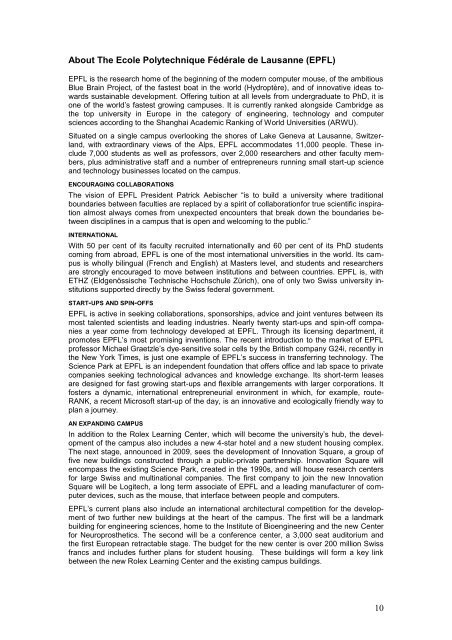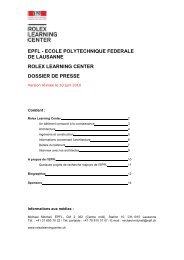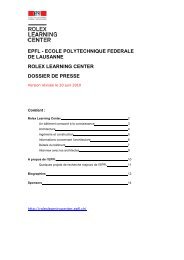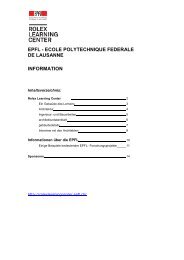press kit - Rolex Learning Center | EPFL
press kit - Rolex Learning Center | EPFL
press kit - Rolex Learning Center | EPFL
Create successful ePaper yourself
Turn your PDF publications into a flip-book with our unique Google optimized e-Paper software.
About The Ecole Polytechnique Fédérale de Lausanne (<strong>EPFL</strong>)<br />
<strong>EPFL</strong> is the research home of the beginning of the modern computer mouse, of the ambitious<br />
Blue Brain Project, of the fastest boat in the world (Hydroptère), and of innovative ideas towards<br />
sustainable development. Offering tuition at all levels from undergraduate to PhD, it is<br />
one of the world‟s fastest growing campuses. It is currently ranked alongside Cambridge as<br />
the top university in Europe in the category of engineering, technology and computer<br />
sciences according to the Shanghai Academic Ranking of World Universities (ARWU).<br />
Situated on a single campus overlooking the shores of Lake Geneva at Lausanne, Switzerland,<br />
with extraordinary views of the Alps, <strong>EPFL</strong> accommodates 11,000 people. These include<br />
7,000 students as well as professors, over 2,000 researchers and other faculty members,<br />
plus administrative staff and a number of entrepreneurs running small start-up science<br />
and technology businesses located on the campus.<br />
ENCOURAGING COLLABORATIONS<br />
The vision of <strong>EPFL</strong> President Patrick Aebischer “is to build a university where traditional<br />
boundaries between faculties are replaced by a spirit of collaborationfor true scientific inspiration<br />
almost always comes from unexpected encounters that break down the boundaries between<br />
disciplines in a campus that is open and welcoming to the public.”<br />
INTERNATIONAL<br />
With 50 per cent of its faculty recruited internationally and 60 per cent of its PhD students<br />
coming from abroad, <strong>EPFL</strong> is one of the most international universities in the world. Its campus<br />
is wholly bilingual (French and English) at Masters level, and students and researchers<br />
are strongly encouraged to move between institutions and between countries. <strong>EPFL</strong> is, with<br />
ETHZ (Eldgenössische Technische Hochschule Zürich), one of only two Swiss university institutions<br />
supported directly by the Swiss federal government.<br />
START-UPS AND SPIN-OFFS<br />
<strong>EPFL</strong> is active in seeking collaborations, sponsorships, advice and joint ventures between its<br />
most talented scientists and leading industries. Nearly twenty start-ups and spin-off companies<br />
a year come from technology developed at <strong>EPFL</strong>. Through its licensing department, it<br />
promotes <strong>EPFL</strong>‟s most promising inventions. The recent introduction to the market of <strong>EPFL</strong><br />
professor Michael Graetzle‟s dye-sensitive solar cells by the British company G24i, recently in<br />
the New York Times, is just one example of <strong>EPFL</strong>‟s success in transferring technology. The<br />
Science Park at <strong>EPFL</strong> is an independent foundation that offers office and lab space to private<br />
companies seeking technological advances and knowledge exchange. Its short-term leases<br />
are designed for fast growing start-ups and flexible arrangements with larger corporations. It<br />
fosters a dynamic, international entrepreneurial environment in which, for example, route-<br />
RANK, a recent Microsoft start-up of the day, is an innovative and ecologically friendly way to<br />
plan a journey.<br />
AN EXPANDING CAMPUS<br />
In addition to the <strong>Rolex</strong> <strong>Learning</strong> <strong>Center</strong>, which will become the university‟s hub, the development<br />
of the campus also includes a new 4-star hotel and a new student housing complex.<br />
The next stage, announced in 2009, sees the development of Innovation Square, a group of<br />
five new buildings constructed through a public-private partnership. Innovation Square will<br />
encompass the existing Science Park, created in the 1990s, and will house research centers<br />
for large Swiss and multinational companies. The first company to join the new Innovation<br />
Square will be Logitech, a long term associate of <strong>EPFL</strong> and a leading manufacturer of computer<br />
devices, such as the mouse, that interface between people and computers.<br />
<strong>EPFL</strong>‟s current plans also include an international architectural competition for the development<br />
of two further new buildings at the heart of the campus. The first will be a landmark<br />
building for engineering sciences, home to the Institute of Bioengineering and the new <strong>Center</strong><br />
for Neuroprosthetics. The second will be a conference center, a 3,000 seat auditorium and<br />
the first European retractable stage. The budget for the new center is over 200 million Swiss<br />
francs and includes further plans for student housing. These buildings will form a key link<br />
between the new <strong>Rolex</strong> <strong>Learning</strong> <strong>Center</strong> and the existing campus buildings.<br />
10





